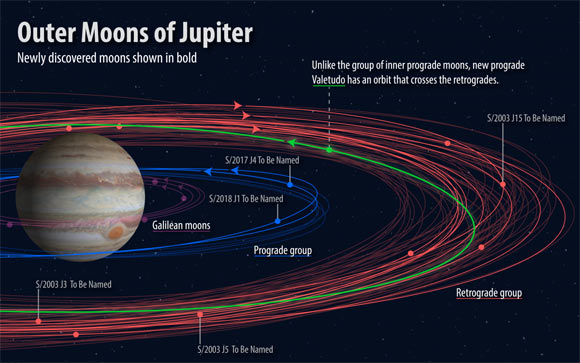In 2018, Carnegie Institution for Science astronomer Scott Sheppard and colleagues discovered twelve new moons orbiting Jupiter. The discovery brought the total number of known Jovian moons to 79 — the most of any planet in our Solar System. Now you can help astronomers select the names for five of these recently-discovered moons: S/2003 J5 (also known as Jupiter LVII), S/2003 J15 (Jupiter LVIII), S/2003 J3 (Jupiter LX), S/2017 J4 (Jupiter LXV), and S/2018 J1 (Jupiter LXXI).

Various groupings of Jupiter’s moons with the recently-discovered ones. Image credit: Roberto Molar-Candanosa / Carnegie Institution for Science.
The naming contest is open to anyone across the globe.
General rules:
(i) Jupiter’s moons must be named after characters from Roman or Greek mythology who were either descendants or lovers of the god known as Jupiter (Roman) or Zeus (Greeks);
(ii) submissions must be 16 characters of fewer, preferably one word;
(iii) submissions must not be offensive in any language or to any culture;
(iv) submissions must not be too similar to the existing names of any moons or asteroids;
(v) names of a purely or principally commercial nature are prohibited;
(vi) names of individuals, places, or events that are principally known for political, military, or religious activities are not suitable;
(vii) names commemorating living persons are not allowed.
Rules for each individual moon:
(i) S/2003 J5 which is retrograde and thus name must be related to Jupiter or Zeus and end in an ‘e’;
(ii) S/2003 J15 which is retrograde and thus name must be related to Jupiter or Zeus and end in an ‘e’;
(iii) S/2003 J3 which is retrograde and thus name must be related to Jupiter or Zeus and end in an ‘e’;
(iv) S/2017 J4 which is prograde and thus name must be related to Jupiter or Zeus and end in an ‘a’;
(v) S/2018 J1 which is prograde and thus name must be related to Jupiter or Zeus and end in an ‘a’.
Contest dates:
February 21 – April 15, 2019.
How to submit:
Tweet your suggested moon name to @JupiterLunacy and tell the astronomers why you picked it using 280 characters or fewer or a short video; and include the hashtag #NameJupitersMoons.







